
07/14/2008
Movies Home / Entertainment Channel / Bullz-Eye Home
"The work is the rehearsal and the performance is the relaxation."
– Michael Caine
Sir Michael Caine would rather you not think about the fact that acting involves real effort. In fact, a lack of pretense marks everything about the working class Korean War veteran turned struggling actor, turned superstar, turned very rich working actor, turned knight of the realm, turned beloved character performer and onscreen valet/surrogate father to a messed-up billionaire playboy/flying rodent impersonator. Admired by his coworkers for his amiable, low-key approach, it's a little surprising to learn that Caine is a strict follower of the Stanislavski method – but that's how it's supposed to work. There's a gentle directness and humor to Caine that has allowed audiences to take him for granted, through five Oscar nominations, two wins and scores of great performances.
Still, with 133 roles and counting, it's kind of a shame that, of his pre-Alfred Pennyworth roles, most people probably know him best for his straight man performance opposite Steve Martin in "Dirty Rotten Scoundrels." Give yourself big time geek points, for example, if you've actually seen Caine's first real breakthrough role as Harry Palmer in the 1965 spy thriller, "The Ipcress File." Back in the day, it was his big A-list breakthrough, but it was quickly eclipsed by the even bigger splash he made as the strangely likable romantic psychopath, "Alfie." And so it goes. With a career that's spanned films good, bad and ugly, Caine's file is so full of great performances that even dedicated film geeks have a hard time keeping track. But it's worth the effort.
"Zulu" (1965)
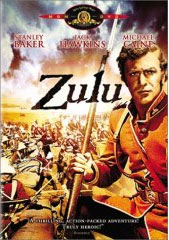 After years of playing characters with names like "Gestapo Agent" and "Man Getting Married," Caine got his first major film role as Lt. Gonville Bromhead in this fact-based, dispassionate epic about vastly outnumbered British colonial soldiers dealing with an onslaught of courageous native warriors in late 19th century South Africa. While Caine has played any number of good, bad and in-between guys over the years, his role in "Zulu" is unique in that it's the only time he's played a character who comes across like an effete ninny, with an upper-crust accent that sounds as strange coming out of Caine's mouth as foie gras from a burrito. Still, as he is forced by Army regulations to defer to bourgeois newcomer Lt. Chard (Stanley Baker), a military engineer with just a day or two greater seniority, our initial dislike of Bromhead is tempered by new facts. He might talk like a refugee from "Jeeves and Wooster," but he's as brave as any member of the unit. In fact, in his first major role in one of England's greatest war films, Caine shines as just one of many members of an outstanding ensemble fronted by a slightly older, salt-of-the-earth star in Stanley Baker. This is great work, and fascinating as an example of Michael Caine the actor before he became Michael Caine the movie star.
After years of playing characters with names like "Gestapo Agent" and "Man Getting Married," Caine got his first major film role as Lt. Gonville Bromhead in this fact-based, dispassionate epic about vastly outnumbered British colonial soldiers dealing with an onslaught of courageous native warriors in late 19th century South Africa. While Caine has played any number of good, bad and in-between guys over the years, his role in "Zulu" is unique in that it's the only time he's played a character who comes across like an effete ninny, with an upper-crust accent that sounds as strange coming out of Caine's mouth as foie gras from a burrito. Still, as he is forced by Army regulations to defer to bourgeois newcomer Lt. Chard (Stanley Baker), a military engineer with just a day or two greater seniority, our initial dislike of Bromhead is tempered by new facts. He might talk like a refugee from "Jeeves and Wooster," but he's as brave as any member of the unit. In fact, in his first major role in one of England's greatest war films, Caine shines as just one of many members of an outstanding ensemble fronted by a slightly older, salt-of-the-earth star in Stanley Baker. This is great work, and fascinating as an example of Michael Caine the actor before he became Michael Caine the movie star.
"Billion Dollar Brain" (1967)
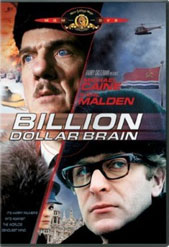 With his working class accent and real life background as a Korean War veteran, Caine was ideal to play Harry Palmer – a borderline criminal army man pressed into Her Majesty's secret service and conceived by James Bond producer Harry Saltzman as the anti-007. Based on novels by Len Deighton, "The Ipcress File" and "Funeral in Berlin" were major hits. Still, these really were anti-Bond films, realistically grungy to a fault. If it weren't for Caine's Palmeresque appearance in "Austin Powers in Goldmember," they'd be in danger of being completely forgotten; but "Billion Dollar Brain" is different. Directed by ‘70s filmmaking lunatic-to-be Ken Russell ("Tommy" "Lisztomania"), it starts out like the earlier movies, but about halfway through it makes a sharp left turn at Greenland, as Harry tangles with Ed Begley, Sr. as a fanatically far-right Texas oil man (is there any other kind?) bent on starting a global apocalypse via a gigantic ‘60s version of a supercomputer. As the story (and Russell's visuals) both go slowly nuts, Caine's performance remains a model of controlled charisma. While character acting greats like Karl Malden (as a treacherous former pal) and Oskar Homolka (as a lovable Russian general) get to have all the scenery-chewing fun, Harry just watches and reacts, the only semi-normal human on view. It wasn't a big hit, and Caine didn't reprise the role of Palmer until 1995, but we think that "Billion Dollar Brain" is kind of a scream.
With his working class accent and real life background as a Korean War veteran, Caine was ideal to play Harry Palmer – a borderline criminal army man pressed into Her Majesty's secret service and conceived by James Bond producer Harry Saltzman as the anti-007. Based on novels by Len Deighton, "The Ipcress File" and "Funeral in Berlin" were major hits. Still, these really were anti-Bond films, realistically grungy to a fault. If it weren't for Caine's Palmeresque appearance in "Austin Powers in Goldmember," they'd be in danger of being completely forgotten; but "Billion Dollar Brain" is different. Directed by ‘70s filmmaking lunatic-to-be Ken Russell ("Tommy" "Lisztomania"), it starts out like the earlier movies, but about halfway through it makes a sharp left turn at Greenland, as Harry tangles with Ed Begley, Sr. as a fanatically far-right Texas oil man (is there any other kind?) bent on starting a global apocalypse via a gigantic ‘60s version of a supercomputer. As the story (and Russell's visuals) both go slowly nuts, Caine's performance remains a model of controlled charisma. While character acting greats like Karl Malden (as a treacherous former pal) and Oskar Homolka (as a lovable Russian general) get to have all the scenery-chewing fun, Harry just watches and reacts, the only semi-normal human on view. It wasn't a big hit, and Caine didn't reprise the role of Palmer until 1995, but we think that "Billion Dollar Brain" is kind of a scream.
"Get Carter" (1971)
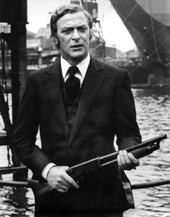 Back when he was only known as Maurice Micklewhite, Michael Caine paid his dues in some very hard places – and not just Korean battlefields. He's even spent time with a paid killer or two, and it was one of them who became the reference point for the chilling antihero of Mike Hodges' remarkable "Get Carter." On a quest to discover who killed his brother and cast his niece in a hardcore stag film, Jack Carter brings new meaning to the term "single-minded ruthlessness." It's not that he cares for his family; it's more that, if anyone is going to murder his brother and corrupt his niece, it had better be him. This is a guy who can't let anyone into his world – and so, Caine barely cracks an expression – yet we know completely what he's thinking, his level of hatred and his sheer love of a bit of brutality against those he despises (i.e. most everyone). And yet, Caine also allows Carter moments of self-awareness, or perhaps self-pity, where he suddenly seems to realize that most people don't go around coldly executing people and putting relatively innocent relatives at risk of torture. Still Caine's Carter makes no apologies. Death is his life. "Get Carter" is considered the first true modern British gangster film, and was eventually remade into an unsuccessful Sylvester Stallone vehicle, but in the U.S. it was originally released on the bottom half of a double bill and remains widely unseen. See it anyway.
Back when he was only known as Maurice Micklewhite, Michael Caine paid his dues in some very hard places – and not just Korean battlefields. He's even spent time with a paid killer or two, and it was one of them who became the reference point for the chilling antihero of Mike Hodges' remarkable "Get Carter." On a quest to discover who killed his brother and cast his niece in a hardcore stag film, Jack Carter brings new meaning to the term "single-minded ruthlessness." It's not that he cares for his family; it's more that, if anyone is going to murder his brother and corrupt his niece, it had better be him. This is a guy who can't let anyone into his world – and so, Caine barely cracks an expression – yet we know completely what he's thinking, his level of hatred and his sheer love of a bit of brutality against those he despises (i.e. most everyone). And yet, Caine also allows Carter moments of self-awareness, or perhaps self-pity, where he suddenly seems to realize that most people don't go around coldly executing people and putting relatively innocent relatives at risk of torture. Still Caine's Carter makes no apologies. Death is his life. "Get Carter" is considered the first true modern British gangster film, and was eventually remade into an unsuccessful Sylvester Stallone vehicle, but in the U.S. it was originally released on the bottom half of a double bill and remains widely unseen. See it anyway.
"Sleuth" (1972)
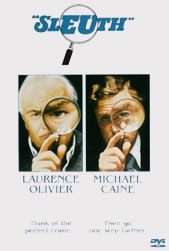 Caine, the method actor, got to "use" his strong feelings about the English class system in this enjoyable, if dated, film version of Anthony Shaffer's witty theatrical thriller. Sharing almost every moment of screen time with the preeminent film and stage actor of Caine's youth, Sir Laurence Olivier, the original film version of "Sleuth" pits a youngish hairdresser with an immigrant father against an upper-crust mystery writer offended that this upstart would dare fornicate with his wife. It's not only a tricky battle of wills, it's also a duet of acting styles, with Olivier representing the traditional, exterior-oriented Shakespearian school of acting against Caine's more interior-based, American influenced style. The two prove evenly matched as Olivier, often stiff or overly theatrical onscreen, gives one of his better film performances in what is essentially a 2 ½ hour acting exercise focusing on sexual jealousy, class hatred and revenge. Caine, however, is especially interesting during the film's middle third when he's asked to pull off an all but impossible acting coup (around a plot point it would be a bit rude to reveal), and he very nearly does that just by, well, being himself being someone being someone else. (That's not a typo.) When Jude Law – a really good actor but perhaps not Caine good – tried the same trick in the unfortunate 2007 "Sleuth" redo (also starring Sir Michael, now playing the aging writer), it was just kind of sad.
Caine, the method actor, got to "use" his strong feelings about the English class system in this enjoyable, if dated, film version of Anthony Shaffer's witty theatrical thriller. Sharing almost every moment of screen time with the preeminent film and stage actor of Caine's youth, Sir Laurence Olivier, the original film version of "Sleuth" pits a youngish hairdresser with an immigrant father against an upper-crust mystery writer offended that this upstart would dare fornicate with his wife. It's not only a tricky battle of wills, it's also a duet of acting styles, with Olivier representing the traditional, exterior-oriented Shakespearian school of acting against Caine's more interior-based, American influenced style. The two prove evenly matched as Olivier, often stiff or overly theatrical onscreen, gives one of his better film performances in what is essentially a 2 ½ hour acting exercise focusing on sexual jealousy, class hatred and revenge. Caine, however, is especially interesting during the film's middle third when he's asked to pull off an all but impossible acting coup (around a plot point it would be a bit rude to reveal), and he very nearly does that just by, well, being himself being someone being someone else. (That's not a typo.) When Jude Law – a really good actor but perhaps not Caine good – tried the same trick in the unfortunate 2007 "Sleuth" redo (also starring Sir Michael, now playing the aging writer), it was just kind of sad.
"The Man Who Would Be King" (1975)
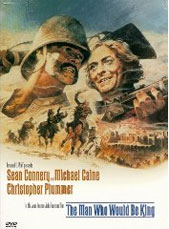 This masterful adaptation of Rudyard Kipling's fable of adventure and hubris is beloved by hardcore film lovers, but has never really gotten the respect it deserves. That's especially unfortunate considering it's Caine's only successful onscreen pairing with his good friend and fellow ex-movie spy, Sean Connery, and the chemistry between the two is remarkable. Caine and Connery portray Peachy Carnahan and Daniel Dravot, a pair of unscrupulous ex-soldiers turned petty conmen, who set out to take over and plunder a small kingdom in what is now Eastern Afghanistan. In a classic example of "be careful what you wish for," Connery's Daniel is mistaken for a god and crowned king. As the personable crook is turned really corrupt by combined influence of power and good intentions, Caine's Peachy is in a terrifying situation, and both his deteriorating friendship, and likely his life, depend on him not showing his anger. Things get even worse when Daniel decides to take a native wife. Interestingly, the beauty in question is played by Shakira Caine, Caine's spouse of two years at the time (and his wife of more than 35 years as of this writing). Director John Huston, one of classic Hollywood's canniest directors, was certainly aware how that casting had to play into Caine's preparation for his performance – and it works. Caine's repressed jealousy/anger is visible throughout the film's devastating final act, making the final reconciliation one of the most surefire tearjerking moments in the annals of toughguy movie male bonding.
This masterful adaptation of Rudyard Kipling's fable of adventure and hubris is beloved by hardcore film lovers, but has never really gotten the respect it deserves. That's especially unfortunate considering it's Caine's only successful onscreen pairing with his good friend and fellow ex-movie spy, Sean Connery, and the chemistry between the two is remarkable. Caine and Connery portray Peachy Carnahan and Daniel Dravot, a pair of unscrupulous ex-soldiers turned petty conmen, who set out to take over and plunder a small kingdom in what is now Eastern Afghanistan. In a classic example of "be careful what you wish for," Connery's Daniel is mistaken for a god and crowned king. As the personable crook is turned really corrupt by combined influence of power and good intentions, Caine's Peachy is in a terrifying situation, and both his deteriorating friendship, and likely his life, depend on him not showing his anger. Things get even worse when Daniel decides to take a native wife. Interestingly, the beauty in question is played by Shakira Caine, Caine's spouse of two years at the time (and his wife of more than 35 years as of this writing). Director John Huston, one of classic Hollywood's canniest directors, was certainly aware how that casting had to play into Caine's preparation for his performance – and it works. Caine's repressed jealousy/anger is visible throughout the film's devastating final act, making the final reconciliation one of the most surefire tearjerking moments in the annals of toughguy movie male bonding.
"The Wilby Conspiracy" (1975)
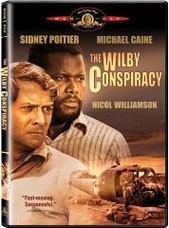 What do good actors do when given a problematic script? They work with it. This film is commendable for being one of the few produced in its time dealing with the then-ongoing crime of South African apartheid. This justifiably little known (yet oddly watchable) thriller brings us Caine as a hotheaded mechanical engineer who stupidly (but effectively) fights a couple of cops and finds himself running for his life handcuffed to Sidney Poitier, playing a recently freed revolutionary. It gets even more impossible when their trail leads them into a caper involving recovering a fortune in stolen diamonds that Poitier's character wants to use to finance his freedom fighting organization. It's all a big mess as Nicol Williamson (playing a fascist/ultra-racist police detective) upstages both Caine and Poitier. But it's Caine who's given the greatest challenge because his character makes almost no sense and behaves in a nearly random fashion throughout. Somehow, however, he just plays each moment – looking us directly in the eye and simply convincing us that, for whatever reason, his character really wants to do whatever he's doing, even though it makes almost no sense. Watch this movie after a few drinks – you might not even notice there's anything up with the story. As for working with a weak script, it was obviously good practice for the slew of often dicey films, including "Jaws: the Revenge," he'd start appearing in over the next 15 or 20 years.
What do good actors do when given a problematic script? They work with it. This film is commendable for being one of the few produced in its time dealing with the then-ongoing crime of South African apartheid. This justifiably little known (yet oddly watchable) thriller brings us Caine as a hotheaded mechanical engineer who stupidly (but effectively) fights a couple of cops and finds himself running for his life handcuffed to Sidney Poitier, playing a recently freed revolutionary. It gets even more impossible when their trail leads them into a caper involving recovering a fortune in stolen diamonds that Poitier's character wants to use to finance his freedom fighting organization. It's all a big mess as Nicol Williamson (playing a fascist/ultra-racist police detective) upstages both Caine and Poitier. But it's Caine who's given the greatest challenge because his character makes almost no sense and behaves in a nearly random fashion throughout. Somehow, however, he just plays each moment – looking us directly in the eye and simply convincing us that, for whatever reason, his character really wants to do whatever he's doing, even though it makes almost no sense. Watch this movie after a few drinks – you might not even notice there's anything up with the story. As for working with a weak script, it was obviously good practice for the slew of often dicey films, including "Jaws: the Revenge," he'd start appearing in over the next 15 or 20 years.
"Dressed to Kill" (1980)
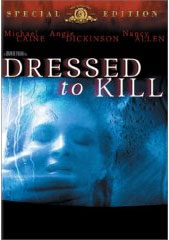 In a career full of close-to-the-vest performances, often portraying men obsessed with power, unexpressed depths don't get much murkier than the character of psychiatrist Dr. Robert Elliott in Brian DePalma's kinky, stylish, bloody and somewhat empty thriller. From the first time we see him, almost simultaneously courting and fending off an advance from a beautiful, carnally undernourished client (Angie Dickinson), we know that there's more to his protestations that he's married and, oh yeah, shrinks aren't supposed to have sex with their clients. Later, when a high-class call girl (Nancy Allen) being menaced by an unknown killer pays a visit, more sexual games ensue as she attempts to draw him out – and this being a De Palma film, that involves her stripping down to her Frederick's of Hollywood skivvies. Nevertheless, the look of cool detachment, and the occasional downward look whenever sex is directly mentioned, indicate that ordinary heterosexual rumpy-pumpy isn't really the issue here, even if the gorgeous young woman of the evening is disrobing right in front of him. It's not that he isn't getting excited, or that he isn't worried that he might have an uncomfortable connection with the killer. He's just experiencing such matters in a different way than most. With only a few glances, Caine provides us with just enough clues into the mystery of his character to fuel the story and, therefore, the terror and suspense.
In a career full of close-to-the-vest performances, often portraying men obsessed with power, unexpressed depths don't get much murkier than the character of psychiatrist Dr. Robert Elliott in Brian DePalma's kinky, stylish, bloody and somewhat empty thriller. From the first time we see him, almost simultaneously courting and fending off an advance from a beautiful, carnally undernourished client (Angie Dickinson), we know that there's more to his protestations that he's married and, oh yeah, shrinks aren't supposed to have sex with their clients. Later, when a high-class call girl (Nancy Allen) being menaced by an unknown killer pays a visit, more sexual games ensue as she attempts to draw him out – and this being a De Palma film, that involves her stripping down to her Frederick's of Hollywood skivvies. Nevertheless, the look of cool detachment, and the occasional downward look whenever sex is directly mentioned, indicate that ordinary heterosexual rumpy-pumpy isn't really the issue here, even if the gorgeous young woman of the evening is disrobing right in front of him. It's not that he isn't getting excited, or that he isn't worried that he might have an uncomfortable connection with the killer. He's just experiencing such matters in a different way than most. With only a few glances, Caine provides us with just enough clues into the mystery of his character to fuel the story and, therefore, the terror and suspense.
"A Shock to the System" (1990)
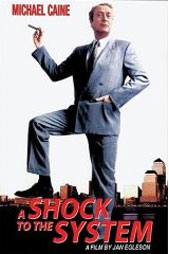 Caine's genius at straddling the line between likable everyman and out-and-out villain gets its best workout in this scabrous black comedy-thriller. Caine's Graham Marshall is a mid-career executive who loses the big promotion that his entire life seems to be hinging on, and his unpleasant wife (Swoosie Kurtz) won't be happy. Seemingly helpless to improve his lot, he accidentally pushes a homeless man into the path of an oncoming subway train on his way home. Realizing the incident will have no consequences for him, Graham discovers his inner sociopath and is suddenly ready to remove human obstacles, starting with his wife and moving on to his obnoxious office rival (Peter Riegert). That's the only way he's going to get the job he's always wanted, as well as the pretty and sympathetic assistant (Elizabeth McGovern) that goes with it. As we watch, we realize that nothing really has changed in Graham. He's always been a conscience-free son of a bitch – he only needed to have his fear removed to become a serial killer in the service of his career. The surprise of Caine's performance here is how he engages our sympathy. Graham isn't doing these things to be cruel, he's just trying to be happy. It's only toward the end that we realize we've joined him in a descent into something very much like pure evil. Graham might look mild, but he's at least as fearsome as the brutal Jack Carter.
Caine's genius at straddling the line between likable everyman and out-and-out villain gets its best workout in this scabrous black comedy-thriller. Caine's Graham Marshall is a mid-career executive who loses the big promotion that his entire life seems to be hinging on, and his unpleasant wife (Swoosie Kurtz) won't be happy. Seemingly helpless to improve his lot, he accidentally pushes a homeless man into the path of an oncoming subway train on his way home. Realizing the incident will have no consequences for him, Graham discovers his inner sociopath and is suddenly ready to remove human obstacles, starting with his wife and moving on to his obnoxious office rival (Peter Riegert). That's the only way he's going to get the job he's always wanted, as well as the pretty and sympathetic assistant (Elizabeth McGovern) that goes with it. As we watch, we realize that nothing really has changed in Graham. He's always been a conscience-free son of a bitch – he only needed to have his fear removed to become a serial killer in the service of his career. The surprise of Caine's performance here is how he engages our sympathy. Graham isn't doing these things to be cruel, he's just trying to be happy. It's only toward the end that we realize we've joined him in a descent into something very much like pure evil. Graham might look mild, but he's at least as fearsome as the brutal Jack Carter.
"The Quiet American" (2003)
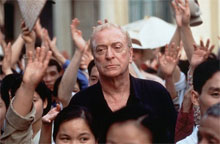 Director Phillip Noyce and writer Christopher Hampton's adaptation of Graham Greene's classic 1954 novel of love, decadence, and very bad U.S. foreign policy during the French colonial portion of the Vietnam War was nearly scuttled by Disney/Miramax in the wake of 9/11. Still, the film, and Michael Caine's ultimately Oscar-nominated performance, was simply too good to dump on to DVD. In what is almost certainly his final role as a "romantic lead," the nearly 70-year-old Caine portrays Thomas Fowler, a journalist in love with the nation of Vietnam as well as one of its more beautiful residents, Phuong (Do Thi Hai Yen). The fact that he is long married to another woman in his native England, and has fallen into some bad habits – some writerly heavy drinking, as well as the occasional bowl of opium – is of little concern. The fact that his lover is being proposed to by a new friend, a handsome, seemingly heroic, young intellectual (Brendan Fraser) connected to the recently renamed CIA is very much his concern. Because, viewed simplistically, Fowler could easily emerge as nothing but an aging letch, we need to understand his position in a visceral way. Caine manages this by his technique of, as he calls it, "holding the mirror" up to his audience. We see ourselves in this corrupted, love-struck fool and, when the journalist abandons his objectivity in the most direct way possible with a terrifying choice, many of us will disapprove, but any thoughtful person should understand.
Director Phillip Noyce and writer Christopher Hampton's adaptation of Graham Greene's classic 1954 novel of love, decadence, and very bad U.S. foreign policy during the French colonial portion of the Vietnam War was nearly scuttled by Disney/Miramax in the wake of 9/11. Still, the film, and Michael Caine's ultimately Oscar-nominated performance, was simply too good to dump on to DVD. In what is almost certainly his final role as a "romantic lead," the nearly 70-year-old Caine portrays Thomas Fowler, a journalist in love with the nation of Vietnam as well as one of its more beautiful residents, Phuong (Do Thi Hai Yen). The fact that he is long married to another woman in his native England, and has fallen into some bad habits – some writerly heavy drinking, as well as the occasional bowl of opium – is of little concern. The fact that his lover is being proposed to by a new friend, a handsome, seemingly heroic, young intellectual (Brendan Fraser) connected to the recently renamed CIA is very much his concern. Because, viewed simplistically, Fowler could easily emerge as nothing but an aging letch, we need to understand his position in a visceral way. Caine manages this by his technique of, as he calls it, "holding the mirror" up to his audience. We see ourselves in this corrupted, love-struck fool and, when the journalist abandons his objectivity in the most direct way possible with a terrifying choice, many of us will disapprove, but any thoughtful person should understand.
"Children of Men" (2006)
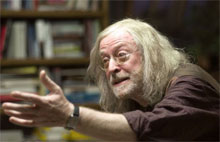 Watching Alfonso Cuarón's near perfect film version of P.D. James' dystopian science-fiction novel of a world without children, it suddenly strikes us that one reason Sir Michael has been so successful playing any number of cads, crooks and outright scum is that, when you get right down to it, there's something downright lovable about the man. For once here, Caine – finally at the age where he has no problem playing smallish character parts – gets to be a really sweet, overgrown boy of a geezer who is unlikely best buddies and surrogate father to Clive Owen's Bogart-esque reluctant hero. His obvious love and doting concern for his semi-vegetative wife, his concern for his troubled friend, his eccentric arguments and silly humor come from a place that seems so real that we really wonder. Of course, Michael Caine is no pot smoking hippie – a nice glass of red wine with dinner seems more his style. However, we also know he is a devoted husband and father who has been married to the same woman for three and a half decades – a true movieland miracle. Could it be that Jasper, who cheerfully sacrifices all for love and friendship, as well as Alfred, the loving but far more proper, surrogate father to the legendary Dark Knight, be the closest thing we've seen onscreen to the real Michael Caine? We'd like to think so.
Watching Alfonso Cuarón's near perfect film version of P.D. James' dystopian science-fiction novel of a world without children, it suddenly strikes us that one reason Sir Michael has been so successful playing any number of cads, crooks and outright scum is that, when you get right down to it, there's something downright lovable about the man. For once here, Caine – finally at the age where he has no problem playing smallish character parts – gets to be a really sweet, overgrown boy of a geezer who is unlikely best buddies and surrogate father to Clive Owen's Bogart-esque reluctant hero. His obvious love and doting concern for his semi-vegetative wife, his concern for his troubled friend, his eccentric arguments and silly humor come from a place that seems so real that we really wonder. Of course, Michael Caine is no pot smoking hippie – a nice glass of red wine with dinner seems more his style. However, we also know he is a devoted husband and father who has been married to the same woman for three and a half decades – a true movieland miracle. Could it be that Jasper, who cheerfully sacrifices all for love and friendship, as well as Alfred, the loving but far more proper, surrogate father to the legendary Dark Knight, be the closest thing we've seen onscreen to the real Michael Caine? We'd like to think so.
You can follow us on Twitter and Facebook for content updates. Also, sign up for our email list for weekly updates and check us out on Google+ as well.











